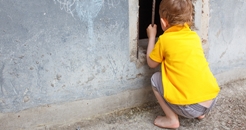 Forecasting which children will cost society the most
Forecasting which children will cost society the most
From research by King’s College London, Duke University and the University of Otago in New Zealand
In December 2016, a study was released by the Universities above, based on a detailed analysis of the lives of nearly a thousand people from birth to age 38. It showed that a small portion of the population accounts for the lion’s share of social costs such as crime, welfare dependence and health-care needs as adults.
It found that just one-fifth of the study population accounted for 81 percent of criminal convictions and 77 percent of fatherless childrearing. This fifth of the group also consumed three-quarters of drug prescriptions, two-thirds of welfare benefits and more than half of the hospital nights and cigarettes smoked.
The researchers found they could have predicted which adults were likely to incur such costs as early as age 3 based on assessments of 'brain health,' giving them hope that early interventions could avoid some of these social costs.
The study combined data from a long-term study of a group of people born in the same year in Dunedin, New Zealand with electronic health records and governmental databases on such things as health, welfare and criminal justice. Data were excellent - every location they’ve lived, every name they’ve used along with which people are using multiple different health and social services.
They wanted to test the 'Pareto principle,' which is also called the '80-20 rule.' Italian engineer and social scientist Vilfredo Pareto observed a century ago that 80 per cent of wealth is controlled by 20 per cent of the population. This principle has subsequently been found a useful rule of thumb when applied to phenomena in computer science, biology, physics, economics and many other fields.
The composite statistical picture the researchers created of this group shows that the most socially ‘costly' 20 percent of the study participants also carried 40 percent of the kilograms of obese weight and filed 36 percent of personal-injury insurance claims.
"Most expenses from social problems are concentrated in a small segment of the population," said Professor Avshalom Caspi from King’s College London and Duke University. "So whatever segment of the health, social or judicial system that you look at, we find a concentration. And that concentration approximates what Pareto anticipated over 100 years ago. We called the group 'high-needs/high-costs’."
The key information the researchers possessed was rich data about the study group in early childhood.
At age 3, each child in the study had participated in a 45-minute examination of neurological signs including intelligence, language and motor skills, and then the examiners also rated the children on factors such as frustration tolerance, restlessness and impulsivity. This yielded a summary index the researchers called 'brain health.'
In the latest study, low scores on the brain health index at age 3 were found to predict high healthcare and social costs as an adult.
"We can predict this quite well, beginning at age 3 by assessing a child’s history of disadvantage, and particularly their brain health." Professor Caspi said, stressing that this ability to identify and predict a person’s life course from their childhood status should be an invitation to intervene, not discriminate - to attempt to change their trajectories – 'for everyone’s benefit,’
"There is a really powerful connection from children’s early beginnings to where they end up. The purpose of this study was not to use these data to complicate children’s lives any further. It’s to say these children -- all children -- need a lot of resources, and helping them could yield a remarkable return on investment when they grow up."
See study here
In previous blogs, I've stressed the importance of early years' development and how the Church could be an agent of transformation working with parents in their communities.
Have you thought about how you could bless expectant parents and parents of 0-5s in the community?
Retweet about this article:
From research by King’s College London, Duke Unive, 10/01/2017